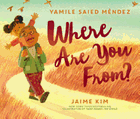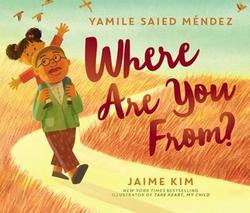
 The emphatic "Where are you from?," often aggressively repeated with "Where are you really from?" is an all-too-familiar scenario for many people of color who call the United States "home." On the playground, at ballet class, at a playdate, one little girl attempts to answer simply: "I'm from here, from today, same as everyone else." But the insistence lingers and the bewildered child can't satisfy her interrogators. She turns to her Abuelo "because he knows everything, and like me, he looks like he doesn't belong." Despite her youth, she's already well aware of her--and her family's--other-ness.
The emphatic "Where are you from?," often aggressively repeated with "Where are you really from?" is an all-too-familiar scenario for many people of color who call the United States "home." On the playground, at ballet class, at a playdate, one little girl attempts to answer simply: "I'm from here, from today, same as everyone else." But the insistence lingers and the bewildered child can't satisfy her interrogators. She turns to her Abuelo "because he knows everything, and like me, he looks like he doesn't belong." Despite her youth, she's already well aware of her--and her family's--other-ness.
Perhaps expecting a geographical pinpoint to her "Where am I from?," the girl observes Abuelo in deep thought, "like he's looking inside his heart for an answer." Hand in hand, Abuelo instead takes her on an extraordinary journey to see the places, people, histories and experiences that make the girl who she is, identifying where she comes from and who her family and community are. "You're from the Pampas," Abuelo begins, "the open, free land." He points out "the brown river that cleanses and feeds the land... that gives us the grain for our bread, the milk from the cows." He leads her high up in the mountains, down into the blue oceans, and tells her about "copper warriors," "island people" and "ancestors [who] built a home for all, even when they were in chains because of the color of their skin." Far and wide they wander, through "hurricanes and dark storms," into "sunshine that lights our path in this world and the rain that washes away our mistakes." And yet, despite all his wondrous explanations, the little girl asks with grave persistence, "But, Abuelo... where am I really from?" With a finger pointed at his heart, he answers, "You're from here, from my love and the love of all those before us."
That intrusive "where are you from" scenario--so often asked of those who aren't white--makes young children especially vulnerable to feeling unwelcome, question their sense of belonging and doubt their very identity. Argentinian-born, Utah-domiciled Yamile Saied Méndez (Blizzard Besties) counters with an enchanted, hand-in-hand odyssey through Abuelo and his granddaughter's richly diverse heritage. Korean-born, North Carolinian artist Jamie Kim (Take Heart, My Child) uses watercolor and digital techniques to create vibrantly hued, double-page-spread landscapes onto which she actively integrates Abuelo and granddaughter sharing the vastness of who they really are. Certain details--pampas grass, the gaucho, Señor Cielo, the May Revolution (25 Mayo 1810) obelisk--point to a South American, likely Argentinian heritage. But the mostly nameless scenes also become an opportunity to acknowledge and celebrate the many, many backgrounds, roots, histories, of those who live in these United States. From the Southern Cross to the North Star, "You are from all of us," Abuelo explains. And, finally, the little girl, surrounded by family and friends as they return home, responds--and reclaims--"I am." --Terry Hong, Smithsonian BookDragon
Shelf Talker: Questioned too often with the intrusive, "where are you really from?," a young girl turns to her wise, thoughtful grandfather for answers.

